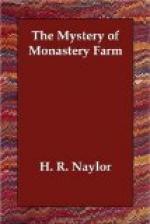Two skilled mechanics had been brought from Quebec, and no one was permitted to see their work nor to learn what they were doing. Their work was to be in the basement, which had been excavated ten feet deep, the massive walls reaching down until they rested upon solid rock. The building was seventy-five feet square. A furnace occupied the center of the basement. Next, in front, was a beautiful office, finished in hardwood, exquisitely polished, and furnished with most modern furniture. In the rear of this office was a smaller room, the walls of which were incased with steel plates, supposed to be both burglar-proof and fire-proof. This room contained a safe having no opening except the door into the office. It would never have been taken for anything but a closet convenient to the main office; but the door was solid iron, the lock of which none but the owner could manipulate. A reception or smoking room, which Mr. McLain called his den, was on the other side of the hallway—a cozy and yet elaborately furnished room, containing tables, sofas, and easy chairs, where the owner could meet his friends for business or pleasure.
Mr. McLain’s father, a sturdy and sagacious Scotchman, had landed in Canada when Abram was about ten years of age, and began in earnest to win at least a living, if not a fortune, in this sparsely settled city, which at that time was hardly worthy the name of a city, although its thoroughgoing citizens had procured a city charter. Mr. McLain by earnest long-sightedness and industry succeeded in becoming a well-to-do citizen. Unfortunately, Mr. McLain invested most of his savings in a large banking institution, located on McGill Street—The Montreal National Bank—which a few months later was consumed in the conflagration. This unfortunate event with subsequent obligations, left him both poor and in debt, from which he never recovered, but in two years died, leaving his wife dependent upon their only son. Some years later, when Abram was accumulating money rapidly, he bought stock in gas and water works, and in both instances they collapsed, and the stockholders were left by a dishonest set of officers to meet delinquent obligations. This experience of both father and son not only met with indignant protestations, but drove Abram to a conclusion wise, or foolish, as the case may be; but he concluded that hereafter he would be his own banker, or at least the custodian of his own money. This accounted for the burglar-proof safe in the basement of the new cottage, and where he could keep every valuable paper, securities, deeds, mortgages, or money. This line of business was no secret in the community. He was his own banker, and when he sold property or anything else, the place of the money deposited was his own safe.
Much of Mr. McLain’s spare time was spent at the Majestic, then the largest hotel in the city, he being its owner. Ernest Case, the acting landlord, took great pleasure in introducing him to customers, and especially if they were prominent persons or had titles attached to their names, who honored this hostelry with their presence.




